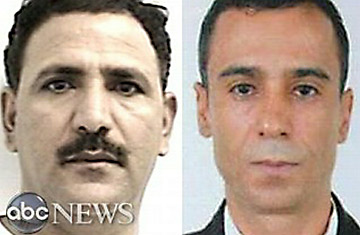
Ahmed Mohamed Nasser al Soofi, left, and Hezam al Murisi were taken off a Chicago-to-Amsterdam United Airlines flight in the Netherlands and charged by Dutch police with "preparation of a terrorist attack"
Were the two U.S. residents of Yemeni origin who were arrested upon landing in Amsterdam on Monday tripped up amid a trial run for a terrorism attack? Or was their apprehension a belated reaction by airline and airport authorities to behavior in Chicago and Alabama that, while strange, was ultimately innocent?
As Dutch officials sift through the clues they have gathered, the public and the media have this information to work on: the men identified in press reports as Ahmed Mohamed Nasser al Soofi, 48, and Hezam al Murisi, 37, were apprehended by Dutch police based on information sent by U.S. authorities after the pair's plane was en route from Chicago. Al Soofi first drew attention on Sunday in Birmingham, Ala., as he sought to board a flight to Chicago in what reports said was unusually baggy clothing. A subsequent search allegedly found him carrying $7,000 in cash; there were reportedly also bundles of cell phones and watches taped together in his luggage. Another cell phone in his bag was allegedly taped to a bottle of Pepto-Bismol. In the absence of anything that could act as an explosive in his luggage, however, al Soofi was allowed to take his plane to Chicago, where he met up with al Murisi. Once together, both men changed their scheduled itineraries to fly to Amsterdam. Before that, however, al Soofi apparently checked his suitcase onto the flight he'd initially booked to Yemen via Washington, D.C., and Dubai. When transport authorities discovered that al Soofi wasn't on that flight as it prepared to leave from Dulles International Airport for Dubai on Sunday, the orphaned bag was removed from the plane. In addition to the cell phones and watches, a search of the suitcase also reportedly turned up knives and box cutters.
None of that is against any rules or laws, however, and even a Homeland Security Authority official was quoted in reports as saying the items in al Soofi's checked baggage didn't pose any danger on their own. So why all the drama?
The pair's ultimate destination, Yemen, most likely had investigators wondering whether the men were planning some future incident. Yemen is, of course, the country where Umar Farouk Abdulmutallab prepared for and departed from on his failed Christmas 2009 attempt to blow up an Amsterdam-Detroit flight using explosives hidden in his underwear. Given that failure, there was some conjecture that al-Qaeda and its supporters may have decided to test attack plans before putting them into action.
However, a European counterterrorism official who has experience with countless inquiries — including partnerships with Dutch, American and Yemeni peers — advises against jumping to conclusions that al Soofi and al Murisi were on a dry terrorism run, even if the details in the case are bizarre. There is the possibility that al Murisi may simply have been packing a lot of cash and a stash of cell phones for family and friends in Yemen. And while the official says the presence of the checked bag on the second flight from Dulles was alarming, that could have been the result of both men deciding to fly together after it was too late to retrieve the checked bag — which should have been pulled off the Chicago-Washington flight.
The official says he can't recall a dry run in any of the scores of cases he's worked on. "Rehearsing an attack runs the considerable risk you'll be caught without ever being able to attempt the strike — which is the only goal of terrorists," he says. "If you're determined to strike and have chosen your method, you'd be better off taking your chances, since success isn't even an option if you don't try. Testing the terrain simply increases the risk you'll be caught without ever really have constituted a threat." Most would-be terrorists, he says, go through painstaking, detail-obsessed planning in the shadows to increase their chances of success once they go into action — though that sort of sweating the small stuff usually helps set off vigilant antiterrorism agencies.
The official admits that he has not heard from his Dutch counterparts or authorities in Amsterdam on whether the men were seriously planning misdeeds or simply bringing the largesse of their American lives home to relatives in one of the poorest countries in the world. The Dutch are staying tight-lipped about the situation, and repeated calls by TIME to public prosecutors and police overseeing the questioning have gone unanswered. Says the official: "Until the Dutch start sharing, either version is just speculation."
